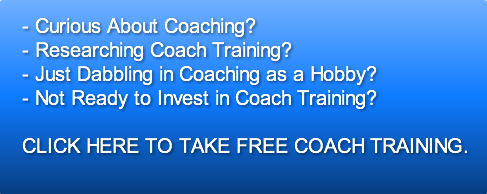
Yesteryday, Coach Maryam Webster shared some 'million dollar coaching for conscious business owners' on Facebook. Of course, what she really did, was warn the innocent away from a predatory type of 'coaching'. Her message included:
''Before buying into any six figure type training, ask to see the teacher's financials...Then run. Far away from cookie cutter trainings and teachers like this...Forget the 6 and 7 figure coach, author & speaker trainings. Those who make money their central theme are playing on your basic survival fears..."
Be sure to read the entire conversation on Maryam's Page (you may need to log in to Facebook, first) before you spend a dime on programs like these, because they are almost always scams...
As I said in my reply to Maryam, I've written on this topic a number of times. I shared several horror stories here. I wrote more recently on the meaninglessness of titles such as 'life coach', here. Do read these posts before working with a 'wealth coach', 'million-dollar coach', 'six-figure coach', 'seven-figure coach', or anybody who calls him/herself a 'coach'. You could save yourself thousands of dollars and years of heartache.
Some of these so-called 'coaches', gurus and teachers have been sued by the likes of the US Securities and Exchange Commission. Others have gone to prison. Their victims have been emotionally devastated, bankrupt, lost their homes, or even lost their lives.
It's a serious problem, but not an easy one to fix. Coaching has a reputation for being high-paid, but to my knowledge, it's still not regulated by any government in the world. Plus most people don't know what it is, except that it involves people talking to each other. That makes it the perfect get-rich-quick scheme for any sociopath who can talk. There are an awful lot of them out there.
Genuine coaches provide valuable services and are nearly always certified by reputable coaching schools and professional associations. They have testimonials from real people you can talk to. Their clients rave about them and you can find them online and research their reputations. Coaches who are certified by the IAPPC, ICF or IAC are usually a good bet.
So why's there a kitten in the picture, above? He's Josey, an abandoned formerly feral baby cat we found half-starved, terrified and awfully lonely. He was desperate enough to let some gigantic strange creatures take him in and feed him and now he's a delightful member of the household. Josey was lucky. Imagine what could have happened to him if a sociopath found him, instead of a family of animal lovers.
When you have a dream of building a 'conscious business', or of answering your calling, or even of becoming wealthy by sharing your brilliance with those who want or need it, you're as vulnerable, and often, as innocent as a kitten. You probably need help from someone who can help facilitate your dream, such as a good coach, but you and your dream can be destroyed by a greedy sociopath. Be careful who you share your dreams with!
Today, Gina Spadafori shared on Facebook that P&G has voluntarily recalled the type of kitten food I feed to Josey. It may be contaminated with salmonella. He was lucky again, because his chow was made in a different batch.
It got me thinking how great it would be if we could recall toxic 'coaches'. It would save a lot of innocent people from being preyed upon. And it would definitely improve the reputation of the coaching profession.
But fake coaches manufacture themselves. They remind me of Sturgeon's Law: 90% of anything is crap. That doesn't mean the top 10% isn't fantastic. In my opinion, million-dollar coaches occupy the bottom 10% of the crap pile.
There is no way to wipe them all out, but you can protect yourself. Stay out of free, or suspiciously low-fee, seminars and webinars. They are designed to get you to spend irrationally. Don't be swayed by money-back guarantees. They usually mean nothing.
Instead, work with certified coaches and get recommendations.
Maryam asked me online what we should do about this problem. I'd like to see a coordinated marketing campaign by coaches, coach-training schools and professional coaching associations that warns the public about unscrupulous coaching practices and how to hire a good coach. I'm not the person to organize this. Do you know someone who is?
If you care about people in general and the coaching profession specifically, please share this blog post or voice your own opinions online. You could save someone from making a horrible mistake.

 The other day, a friend of mine tagged me in her comments on Facebook about a blog post on how life coaches shouldn't quit their day jobs, because you just can't make a living as a life coach.
The other day, a friend of mine tagged me in her comments on Facebook about a blog post on how life coaches shouldn't quit their day jobs, because you just can't make a living as a life coach.















 Like millions of others, I've grown to love
Like millions of others, I've grown to love 

 A committed leader devoted to help steer the future direction of the coaching profession, Dr. Kristi Arndt is Vice President of the International Association of Coaching (IAC). Kristi integrates extensive knowledge of the Human Design System to guide her clients according to life strategies that are correct for them. A lifelong learner and agent of change, she has fifteen years of professional experience in secondary and higher education settings including roles as a university learning center director and faculty development coordinator at a veterinary school. Kristi is a Master Certified Coach with the IAC and a Board Certified Coach through the Center for Credentialing and Education who earned PhD, EdM, and DVM degrees from the University of Illinois at Urbana-Champaign. To get better acquainted, please book an appointment with her at
A committed leader devoted to help steer the future direction of the coaching profession, Dr. Kristi Arndt is Vice President of the International Association of Coaching (IAC). Kristi integrates extensive knowledge of the Human Design System to guide her clients according to life strategies that are correct for them. A lifelong learner and agent of change, she has fifteen years of professional experience in secondary and higher education settings including roles as a university learning center director and faculty development coordinator at a veterinary school. Kristi is a Master Certified Coach with the IAC and a Board Certified Coach through the Center for Credentialing and Education who earned PhD, EdM, and DVM degrees from the University of Illinois at Urbana-Champaign. To get better acquainted, please book an appointment with her at
